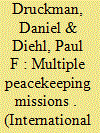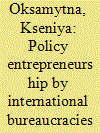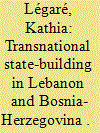|
|
|
Sort Order |
|
|
|
Items / Page
|
|
|
|
|
|
|
| Srl | Item |
| 1 |
ID:
158025


|
|
|
|
|
| Summary/Abstract |
The paper challenges the theoretical and empirical orthodoxy surrounding the debate on international military intervention and mass atrocity endings, via an evidence-based analysis of the situation in East Timor in 1999. By combining existing but under-explored data on mass atrocities with eye-witness accounts, new key informant interviews, and a detailed review of secondary sources, we demonstrate that the wave of militia-perpetrated violence in September 1999 was extinguished prior to the arrival of international military forces. We demonstrate the unique effect of national political factors, when combined with the pressures of international diplomacy, which combined to end mass atrocities in this particular case. We find that the Indonesian regime was not a uniformly recalcitrant regime opposed to ending the atrocities, and demonstrate how factors operating across the national and sub-national levels combined to force the Indonesian leadership to bring the militia perpetrators of this brutal episode of violence under control. Through our new empirical analysis, and the alternative explanation we present to explain endings of mass atrocities in this case, we challenge the tendency to focus on international military intervention as the means by which mass atrocities come to an end.
|
|
|
|
|
|
|
|
|
|
|
|
|
|
|
|
| 2 |
ID:
158027


|
|
|
|
|
| Summary/Abstract |
This article investigates the connection between invitations to intervene and the creation of legitimacy for European Union (EU) and North Atlantic Treaty Organization (NATO) operations. By tracking the incidence and source of pleas for an intervention, this study finds that invitations are associated with most EU and NATO interventions, and identifies three different types of invitations – true, collaborative, and rigged – which denote greater or lesser degrees of demand for Western security services. This variability in demand for Western security services signalled by the three types of invitations impacts the level of legitimacy associated with an EU or NATO operation: true invitations confer the greatest amount of legitimacy, collaborative invitations generate weaker legitimacy, and rigged invitations create low levels of legitimacy. Moreover, both organizations have, at times, coerced external political actors into offering an invitation to intervene in order to manufacture stronger legitimacy for their interventionist designs. Ultimately, because invitations play such a large role in prompting EU and NATO interventions, international relations scholars and political leaders should carefully consider their quality and influence on the decision-making process when determining the initial legitimacy for an interventionist operation.
|
|
|
|
|
|
|
|
|
|
|
|
|
|
|
|
| 3 |
ID:
158026


|
|
|
|
|
| Summary/Abstract |
Peace operations now conduct a wide range of different missions, but much of the scholarship has focused only on one mission at a time, and most often this is the task of monitoring cease-fires. This article draws attention to the phenomena of multiple missions within peace operations, and discusses some of the hurdles to understanding how such missions influence one another. We begin by providing a descriptive analysis of 11 different peace missions carried out by UN operations over the 1948–2015 period. Following a review of multiple-mission studies to date, we call attention to several problems with approaches taken for understanding peacekeeping outcomes. We then elucidate seven considerations or challenges in understanding how missions interact with one another and influence each other’s success, providing guidelines for how to analyse them.
|
|
|
|
|
|
|
|
|
|
|
|
|
|
|
|
| 4 |
ID:
158028


|
|
|
|
|
| Summary/Abstract |
The UN Secretariat’s role in the expansion of peacekeeping after the cold war is debated. Different theoretical accounts offer competing interpretations: principal–agent models and sociological institutionalism tend to emphasize the Secretariat’s risk-averse behaviour; organizational learning scholarship and international political sociology find evidence of the Secretariat’s activism; constructivism analyses instances of both. I argue that the UN Secretariat can be both enthusiastic and cautious about new tasks depending on the circumstances and the issue area. For example, UN officials have been the driving force behind the development of public information campaigns by peacekeeping missions aimed at the local population. During the cold war, it was not regarded as necessary for UN missions to communicate with the public in the area of operation: their interlocutors were parties to the conflict and the diplomatic community. With the deployment of the first multidimensional missions in the late 1980s and the early 1990s, UN staff realized the need to explain the organization’s role to the local population and provide information about UN-supported elections. In promoting this innovation, they played the role of policy entrepreneurs. The institutionalization of this innovation, however, was not an automatic process and required continuous advocacy by UN information staff.
|
|
|
|
|
|
|
|
|
|
|
|
|
|
|
|
| 5 |
ID:
158029


|
|
|
|
|
| Summary/Abstract |
When civil wars end, political institutions are the main topics of conflict. The implementation of peace settlements often stall, and foreign sponsored initiatives might be put in place to build the state as to strengthen peace. This article aims to explain their impact. It proposes that post-conflict reconstruction follows a cycle, which alternates between phases of status quo, debate, and crisis. It argues this process is powered by the struggles between coalitions of political forces, including foreign parties, promoting their own understanding of the peace deal. It compares two cases of deeply divided societies located in a complex geopolitical environment: Lebanon and Bosnia-and-Herzegovina. The analysis focuses on the interrelations between foreign and domestic parties and their evolution by tracing the formation and collapse of transnational coalitions. It shows the major role these coalitions played in breaking the political deadlock and starting constitutional negotiations, but also in triggering a political crisis. The similarities between these otherwise unique cases highlight the limits set on foreign interventions, and explains how actors of the two environments interact. It concludes that if state-building initiatives under external influence can make significant gains, they leave the states highly vulnerable to political instability.
|
|
|
|
|
|
|
|
|
|
|
|
|
|
|
|
| 6 |
ID:
158030


|
|
|
|
|
| Summary/Abstract |
Despite the certification of Côte d’Ivoire’s 2010 presidential elections by the United Nations Operations in Côte d’Ivoire (UNOCI), they resulted in the most violent of Sub-Saharan Africa, in the two decades since the transition to a democratic dispensation. UNOCI and Ivorian authorities embarked on a certification process in order to infuse credibility into a system and institutions divided along religious, regional, and cultural fault lines. Instead, the four months of fighting between the two main political parties nearly plunged the country back into civil war. This paper examines why certification could not provide a credible process; it considers the roles and leverage of the broader international community, to conclude that UNOCI did not have the relevant tools or capacity at its disposal, nor were there adequate incentives to resolve the factors threatening the peacefulness of elections. By prioritizing the holding of elections, without ensuring sufficient levels of peace, security, and inclusivity in Côte d’Ivoire, certification not only failed, but enabled the flourishing of an environment inimical to free, transparent, and credible elections.
|
|
|
|
|
|
|
|
|
|
|
|
|
|
|
|
|
|
|
|
|